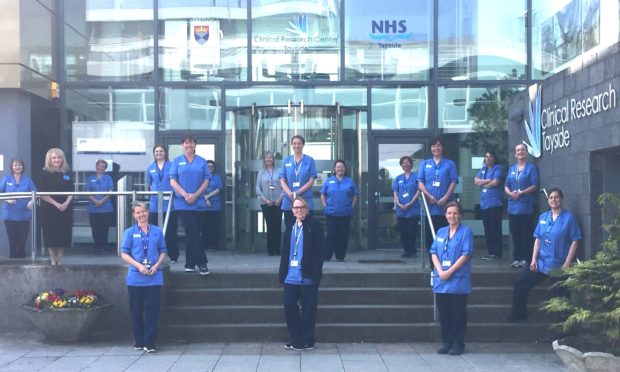Dozens of Tayside Covid-19 patients are playing a vital role in clinical trials to help in the fight against coronavirus.
NHS researchers based at the Clinical Research Centre in Dundee, supported by the Tayside Medical Science Centre, have embarked on trials which it is hoped will influence treatment decisions and benefit patients.
The development follows the first human Covid-19 vaccination trials in the UK and an announcement Dundee University researchers are leading trials of a new medication to prevent lung damage, which could be used to treat coronavirus.
NHS Tayside said its clinical research nursing team is working closely with the teams in the Covid wards, recruiting patients to the trials and supporting delivery of the studies.
Professor Jacob George, director of research and development for NHS Tayside said: “It is crucial that patients have the opportunity to participate in these clinical trials in order to help scientists and clinicians find effective treatments for this devastating pandemic.
“We are grateful to patients and their families who are helping us with this.”
Research under way in Tayside includes RECOVERY (Randomised Evaluation of Covid-19 Therapy), a national clinical trial for hospitalised Covid-19 patients led by the University of Oxford.
There are currently 29 patient participants in Tayside being studied by clinical research nurses provided by Clinical Research Centre (CRC) at Ninewells.
That study is being led locally by Professor James Chalmers, Consultant and Professor of Respiratory Research, at the Ninewells-based Scottish Centre for Respiratory Research.
The RECOVERY trial aims to establish the effectiveness of potential treatments by comparing usual care only, to usual care in combination with a number of potential treatments.
In addition, Liverpool and Edinburgh Universities are collaborating on an other study which has so far collected data on 73 patients and is being led locally by Dr Nikolas Rae, Consultant in Infectious Diseases at the Infection and Immunodeficiency Unit in Ninewells.
It aims to recruit at least 1,300 UK study patients over the next year and has begun publishing clinical data reports nationally on its findings.
A Genetics of Mortality in Critical Care (GenOMICC) study being is led by the University of Edinburgh and has seen nine Tayside patients recruited.
It is being led locally by Ninewells Anaesthesia and Intensive Care Medicine consultant Dr Stephen Cole.
Tayside is also involved in STOP-COVID (Superiority Trial Of Protease inhibition in COVID-19), the first Scottish-led multi-centre placebo-controlled randomised drug trial evaluating Brensocatib, an oral medication that has shown to reduce lung damage by inhibiting enzymes that destroy lung tissue.










